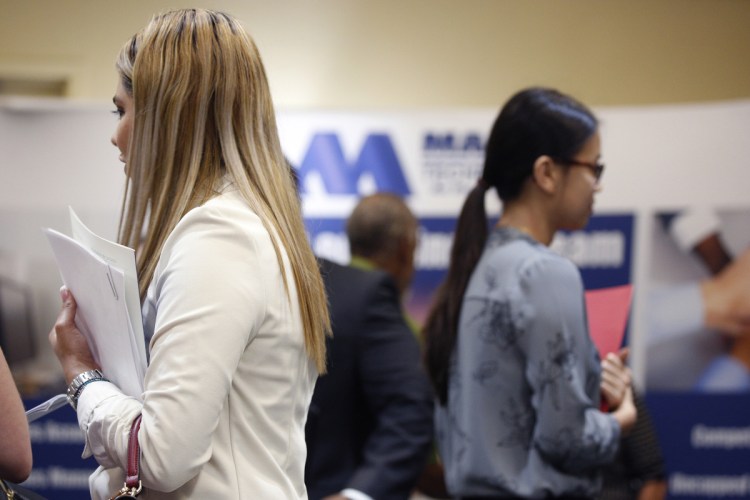WASHINGTON _ The U.S. economy added 213,000 jobs in June, the Labor Department reported Friday, as the unemployment rate rose to 4 percent.
The small increase in unemployment – up from 3.8 percent in May – appears a result of Americans who’d given up on finding employment now looking for jobs once again, according to the Labor Department figures released Friday. With job openings at record highs, many of those workers are likely to find employment soon, and many experts still predict the unemployment rate will fall further by the end of the year to the lowest level since 1969.
Despite the low unemployment and struggles to find workers, companies still appear hesitant to significantly raise pay in many industries. Average hourly earnings are 2.7 percent higher than a year ago, a lackluster pace compared to past eras of healthy job growth when wages were rising at 3.5 percent or more a year.
“It’s not your father’s labor market anymore,” said Diane Swonk, chief economist at Grant Thornton. “Clearly there are some sectors like trucking where wages are going up, but warehousing wages really collapsed and are only now just $12 or $13 an hour.”
The Labor Department also revised its estimates for job growth in May, going from a previous estimate of 233,000 new jobs to 244,000 jobs new jobs. The department also boosted its estimate for April job growth up to 175,000 – up from an earlier assessment of 159,000.
The United States has now added jobs for 93 straight months, a record streak of hiring. As executives say they cannot find enough qualified workers, many are turning to hiring people who are currently incarcerated or people with disabilities.
“Employment growth remains strong. [Job] gains have averaged 215,000 per month so far this year, up from 182,000 last year,” said Jim O’Sullivan, chief U.S. economist at High Frequency Economics. “That is more than strong enough to keep the unemployment rate trending down over time.”
Job growth was widespread across the economy with solid gains in business, health care, construction and manufacturing. The only sore spot was retail, which shed 22,000 jobs as Toys R Us shut its doors.
President Trump frequently touts the strong jobs picture as hiring has picked up in recent months. Hispanic unemployment fell to a record low of 4.6 percent in June, and unemployment remains near record lows for African-Americans and for Americans without college degrees.
While economists say the tax cuts are boosting growth this year, they warn that Trump’s actions on trade could have damaging impacts on the economy and jobs.
“People are worried. The trade war isn’t hurting them yet, but they are concerned. We can take a little bit of a trade skirmish, but not a full-blow trade war,” said Swonk. “If this doesn’t stop, manufacturing will take a hit.”
The United States imposed the first duties on $34 billion in Chinese goods early Friday, and China immediately retaliated with levies on an equal amount of American goods, including heartland staples like soybeans, corn, pork and poultry. The U.S. is now in a trade war with all of its top five trading partners: China, Canada, Mexico, the European Union and Japan.
The Federal Reserve on Thursday reported some businesses had already scaled back or postponed planned investment due to the trade struggles, and warned that many more promise to do more if the spats continue to escalate. The Fed is also gradually raising interest rates, easing off the extraordinary efforts it took to stimulate the economy after the Great Recession and looking instead to ward off future spikes in inflation.
Send questions/comments to the editors.



Comments are no longer available on this story